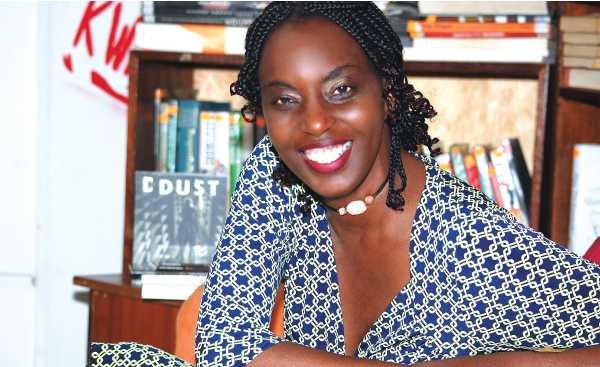YVONNE ADHIAMBO OWUOR; TEDx Speaker & Award Winning Writer on Courage To Pursue Calling.

“I was 35 years old when my first story, Weight of Whispers, came out. It was at a time when Kwani Trust, the literary publishing house, was emerging. It took along time for me to recognise and accept the thing that I really truly loved. Writing.
My interest in books definitely started while I was in primary school. Reading and story telling were greatly emphasised. My family is also full of readers. We loved collecting books and considered them to be companions. My father who worked for the Federation of Kenya Employers for the longest time travelled a lot and would bring us mementos such as art, music and books from different parts of the world. In a way he opened us up to the world and at the same time, he brought the world into our home.
After my secondary school studies, despite my many pleas to study abroad, my father insisted that I join Kenyatta University where I studied history and English. Ironically, the one thing I considered utterly useless in my study life – the degree – became the very thing that I fell back on when I started laying the foundation for my literary journey.
After my studies at Kenyatta University, I joined the technology world and worked for Apple Computer Company as a field support officer, solving clients’ computer problems. Two years later, I moved to Swaziland to head the Apple Centre there.
Two years after that, I joined the communication department of the Swazi Business Growth Trust still in Swaziland. Much later, I applied and won a Chevening Scholarship to join the University of Reading for a Master’s degree in development communications.
Ironically, the one thing I considered utterly useless in my study life – the degree – became the very thing that I fell back on when I started laying the foundation for my literary journey.
Coming back Home
In 2002, I came back to Kenya expecting the country to welcome me with open arms because I had arrived with this degree and was ready to transform the African, nay, Kenyan communication and development sector. That did not happen.
I submitted over 80 job applications and each one was turned down. Talk about learning humility! I walked from place to place begging for a job, I was willing to do anything. I volunteered in organisations and did not earn a coin. The shock of finding out that life had not waited for me made me feel like I did not have a place in my own country. These were soul-breaking moments.
I was still stuck in the ‘ideal world’ of how life was supposed to be. I had gone to school, performed well, gained experiences and gotten a degree. I was supposed to walk into an organisation, get a job at a certain level, buy a car, build a house and settle down. It was nothing like that. Everything crumbled. I was in a personal crisis.
I came back to Kenya expecting the country to welcome me with open arms because I had arrived with this degree…I submitted over 80 job applications and each one was turned down. The shock of finding out that life had not waited for me made me feel like I did not have a place in my own country.
It was a time of terrifying darkness but looking back, it was also a sacred time of getting rid of baggage. I found out who my true friends were and learnt to appreciate my family and especially my mother who was a pillar of strength during that trying time. I also found the real heart of Yvonne. It was at that time that several things happened.
Binyavanga Wainaina won the Caine Prize for African writing in 2002 and those of us who had been deeply closeted in our lives that we dared not write, emerged, awed by his achievement. You have to understand the phenomenon of a writer from our age group winning a global prize for a story that did not feature a goat, witch doctor, HIV /AIDs or drums, upped my psyche and made me realise that the stories I wanted to tell were possible. (I am not against those types of stories by the way, however, Binyanvanga became this force of nature that gathered us around another kind of story telling in Kenya). It was at that moment in a nerve-racking way, that I dared to admit that they were stories I wanted to tell and not all these other things, as amazing as they were.
It is also from these and meetings with other writers that the event that became Kwani? emerged, and I was woven into it. I remember walking around the different Nairobi streets (I could not afford bus fare) experiencing people and nature, and learning Nairobi in a new way. I learnt things that informed my writing and up to now, when I go to a new place, I need to walk in order to inhale the place, eavesdrop and listen to the conversations of its people. Of course, back then, I just thought, “Why is life not working out for me.”
It was at that time, at Binyavanga Wainaina’s insistence and persistence that I wrote my first book, Weight of Whispers and less than a year later, in 2003, it won the Caine Prize for African writing. Weight of Whispers follows the story of an African refugee in Kenya following a genocide in their country.
With the award, the world opened and many opportunities came calling including publishers. The assumption was that I was constantly writing so I must have had a manuscript somewhere. I didn’t dare to tell them that I had nothing let alone that Weight of Whispers was the only book I had ever written.
When it rains it pours, because shortly prior to the award, I was invited to be the Executive Director of the Zanzibar Film Festival of the Dhow countries. A while back, following an obscure advertisement I had seen while browsing in a cyber café, I sent out an application. I never expected much from it so it was a surprise when they called back for an interview and invited me for a two-day tour of the festival. Two days turned into six months (that was the next time I came back to Kenya) as I ended up taking the job offer on the spot.
The festival, showcases the arts including, music, film and literary events. Looking back, I realised that even though I was at home in creativity and the arts, I had done just about everything to avoid working in this field. I worked in Zanzibar for three years and in that time, I did not pen a single word. I always joke that Zanzibar was my excuse not to write. Writers are not renowned for procrastination and I am a procrastinator and I do it in a way that is so impressive because I look for worthy projects as alternatives.
In 2005, I was invited to the Iowa writing programme in America, which lasted for three months. As the programme came to a close, I was forced to face where my loyalties lay. While trying to connect on a flight back to Zanzibar, I froze. Instead of picking a flight back to Zanzibar, I took a cab to my parents’ house in Nairobi and started on my second book, Dust.
Dust’s initial inspiration was the 2005 Kenya referendum and the different voices of Kenyans concerning the new constitution. Life seemed uneventful until the disputed Kenyan election of 2007.I got a call from Binyavanga, saying he was going to Eldoret, one of the worst hit hot spots with a couple of other writers and I needed to join them. Somebody needed to not only tell, but change their story. Seeing the suffering of Kenyans during this time changed me. I love my country and seeing its brokenness was heart-wrenching. It was the experiences of these Kenyans that informed the return to and final re-write of Dust.
In 2011, I resigned from my job with the Aga Khan University to ‘attempt’ to dedicate myself to my writing. I was also fortunate in that the University of Queensland in Australia offered me a scholarship in Creative Writing. It was then that I gathered enough confidence to call myself a writer. Ten years after Weight of Whispers, Dust found its first publisher, Knoph publishers, in the US.
In September, Dust was declared the winner of the Text Book Centre-Jomo Kenyatta Prize for Literature Award one of Kenya’s foremost literary awards.
“You know that proverb about the sweetness of the food can only come from your mother’s kitchen? Winning the Text Book Centre –Jommo Kenyatta prize was like finally a ‘welcome home’ mat after being on the road and restless for so long.
Note: In 2013, Kwani Trust acquired the rights to publish limited editions of Dust for its tenth anniversary. Thereafter it was published in the UK. The German and French translations were published in 2016. Published in December 2015




